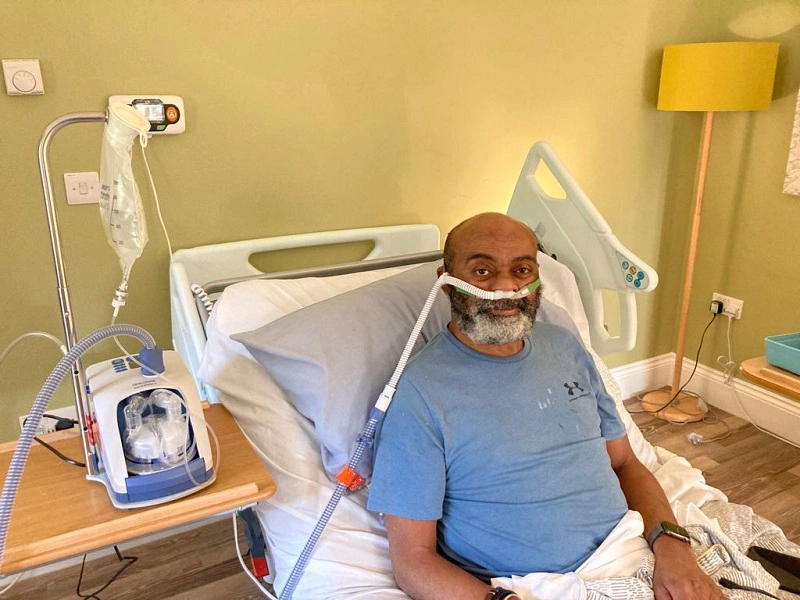
Keith talks about his newfound interest in birdwatching with a wry smile. “If you’d told me a year ago that I would be a twitcher, I would’ve laughed so hard.”
Upon his arrival at The Hospice of St Francis in February, the sixty-two-year-old Watford man was given a bird identification chart and a pair of binoculars. He’d spent the months beforehand in and out of hospitals, after an unexpected diagnosis of Interstitial Lung Disease hit him like “a whirlwind, a rollercoaster and a tsunami.”
Keith began keeping a tally of birds outside his window at the Hospice. “It was like, wow! I’m learning. You lose yourself in it.”
Prior to his diagnosis in September, Keith worked as a financial auditor, and was also a keen sportsman in his youth, specialising in martial arts. But in hospital, he needed to wear an uncomfortable oxygen mask at all times and his condition worsened. “For six to seven weeks, I couldn’t move from one side of the bed to the other,” he says.

His wife, Wendy, says she was called by Watford General Hospital in late December and thought it was her last day with Keith. The hospital planned to use mechanical ventilation which would require Keith to be sedated. Keith explains, “At hospital the wheels fell off and the engine blew up.”
Dr Chadwick, the Hospice’s Medical Director, saw Keith in the hospital and arranged for him to be transferred to the Hospice. She then arranged for a cutting-edge High Flow Nasal Oxygen (OptiFlow) machine to be brought to the Hospice. This technology can improve breathing and recovery by providing warm, humidified high flow oxygen through a small nasal cannula. We’re one of only two hospices in the UK to have ever used one of these machines.
Keith arrived at the Hospice with a thick beard because he hadn’t been able to remove his oxygen mask to shave in hospital. But with the OptiFlow machine, Keith could have conversations with his three daughters and finally shave his beard. “I was so used to a mask it was as though my brain wanted to take a mask off before letting me drink,” he recalls.
Wendy described their first day at the Hospice. “That welcome we got when we walked in was unbelievable. They were actually expecting us. It was like, thank God. Such a relief. I’ll be able to sleep at night.”
Keith says that all of the Hospice staff have gone above and beyond to help him feel like himself again. “Everyone is invested in you as an individual,” he says. “I feel like a person who just happens to be a patient.”
After ten days in the Hospice, Keith’s appetite improved and he began feeling stronger. He went from being immobile in bed to getting up and sitting in a chair. Keith benefitted from rehabilitation support with the Wellbeing Team. “They gave me self-belief,” he says. “The difference is like night and day. They’ve given me the tools and it’s about finding the right tool.”
Soon, Keith was reminiscing about friends who recently visited with a bottle of wine. “The day I stood unaided,” he says. “I actually cried. It was so overwhelming.”
Keith credits Dr Chadwick with his improved situation, calling her ‘a force of nature’. “Dr Chadwick is always willing to answer my questions,” Keith says. “She’s someone who understands and wants to listen to me. She went through hoops to apply for the OptiFlow, and she’s always been real with me.”
Despite Keith’s difficult journey, his spirit remains undimmed. He’s excited about the birds he’s yet to identify and his new talent for decoupage. He says that the Hospice team “enabled us to move forward. They’ve given us some semblance of our life. Before I was patient 22 – now I’m Keith again.”
His wife Wendy says, “We’ve been overwhelmed by kindness at the Hospice. The support for our family has been phenomenal. I couldn’t believe it – that people can be so kind. It puts your faith back in humanity.”
Sadly, since sharing his story, Keith passed away in May 2023 with the support of the Hospice. We are grateful to Keith’s family for giving permission for his story to continue being shared.






Share Article